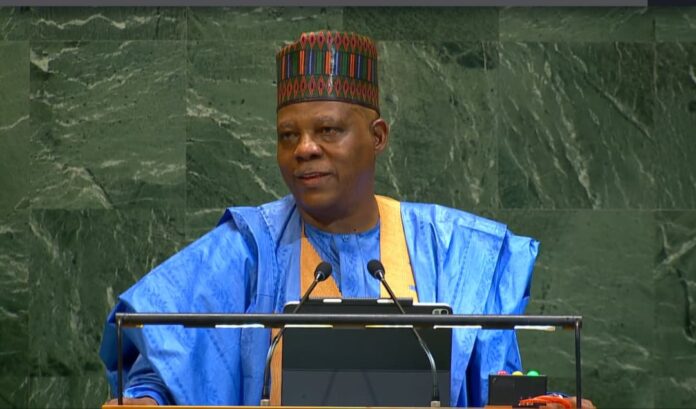…Demands Security Council Seat, Backs Palestine, Calls for Financial Court
By: Abdullahi Inuwa
President Bola Ahmed Tinubu has thrown down the gauntlet at the United Nations, warning world leaders that unless the global body undergoes sweeping reforms, it risks fading into irrelevance.
Speaking at the 80th UN General Assembly (UNGA80) through Vice President Kashim Shettima, President Tinubu sharply criticised the organisation’s “careful diplomatic language” and inaction on conflicts, particularly in the Middle East, describing them as “stains on our collective humanity.”
He said credibility is slipping from the UN because “key events are beginning to take place outside this hall” and urged urgent reforms, starting with Nigeria’s demand for a permanent seat on the UN Security Council.
“Nigeria must have a permanent seat at the UN Security Council. The United Nations will recover its relevance only when it reflects the world as it is, not as it was,” he declared.
Taking a firm stand on the Palestine question, President Tinubu insisted that a two-state solution is the most dignified path to peace.
“The people of Palestine are not collateral damage… They are human beings, equal in worth, entitled to the same freedoms and dignities that the rest of us take for granted,” he said.
In a radical proposal, Tinubu called for the creation of an international financial court system to manage sovereign debt. Such a mechanism, he argued, would free developing nations from the “economic straitjacket of primary production of unprocessed exports” and pave the way for genuine prosperity.
“Debt relief must not be seen as charity, but as a path to peace and stability that benefits us all,” he added.
Positioning Nigeria’s mineral endowment and economic reforms as a model for Africa, President Tinubu urged fairer partnerships with mineral-producing nations.
“Africa – and I must include Nigeria – has in abundance the critical minerals that will drive the technologies of the future. But we must benefit fairly – in investment, local processing, and jobs,” he stressed.
He also backed the UN Secretary-General’s call that “AI must mean Africa Included,” warning that the digital divide must be closed to prevent deepening inequality.
On Nigeria’s domestic front, Tinubu defended his government’s tough economic reforms, including subsidy removal and exchange rate unification, describing them as painful but necessary.
“Our task is to enable, to trust in the ingenuity of our people. The process is difficult, but it is the path to sustainable transformation,” he said.
He also linked Nigeria’s long fight against violent extremism to a broader truth: “Military tactics may win battles, but in wars that span generations, it is values and ideas that deliver ultimate victory.”
President Tinubu concluded with a rallying cry for renewed multilateralism, cautioning that failure to act would leave the UN sidelined by history.
“We must make real change, change that works, and change that is seen to work. If we fail, the direction of travel is already predictable,” he warned.




